Parasites often prevent a person from living normally, because they significantly weaken the body. What representatives parasitize in us most often and how to deal with it - the article will tell.
Parasites are creatures that live and feed on their host. They can inhabit all animals, fish, birds, as well as humans. This causes a lot of problems, because these creatures practically spoil health. Parasites in the human body can live in the liver, intestines, blood, and even attack the brain and lungs. What are the most common types? There are several categories of parasites: flat and round worms, protozoa and insects. How they affect the body and how to expel them - the article will tell.
Types of parasites
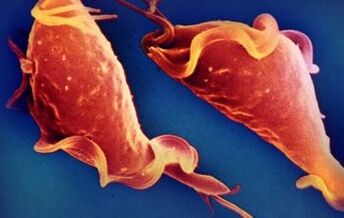
As already mentioned, there are different types of parasites in the human body:
- protozoa (trypanosome, plasmodium malaria, lamblia, amoeba dysentery);
- tapeworms (cat fluke, liver fluke, cattle and pork tapeworm);
- roundworms (roundworms, pinworms);
- insects (lice, horseflies, fleas);
- chelicera (mites).
These species most often attack the human body. All of them are united in the fact that they feed on the juice and tissue of their host, slowly killing them. It is difficult to expel one of them, because each has a lot of fixation devices (suckers, hooks, chelicera), and some even settle in the cells of the body, from which it is simply impossibleto expel them.
Everyone is probably familiar with lice, fleas and ticks, because these creatures live on the surface of the body, they are easy to find, and it is a little easier to fight. But not everyone is aware of internal body parasites, and in fact, they are the most dangerous for health.
The simplest
These small organisms are found everywhere:
- in water;
- Earth;
- air.
It is impossible to see them, because they are made up of only one cell. There are harmless representatives: ciliated shoe, proteus amoeba, green euglena and others. Some even help animals, for example, some ciliates digest cellulose from grass for cows, but there are many parasites among this abundance.
Malaria Plasmodium
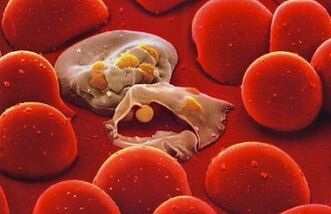
This native of Central Africa now haunts many countries. Plasmodium malaria is carried by mosquitoes of the genus Anopheles, which are not very fussy, and the main thing for them is heat and water. Many countries have taken steps to prevent the disease: they have drained the swamps, destroyed the larvae, and the disease has receded there, but this parasite is still raging in the region of Central Africa and South Africa. 'South America.
Once in the body, plasmodium malaria goes through two stages: hepatic and erythrocyte. The first passes after a few hours. Plasmodium attacks, enters liver cells, begins to multiply, and feeds on nutrients from the host. At this time, a person already feels the first unpleasant symptoms:
- headache;
- nausea;
- lack of appetite.
After a few days, the parasite leaves the liver in the bloodstream and settles in the red blood cells. He has lived there for a long time. Every 3-4 days it leaves one and enters the other. The discharge is accompanied by the release of waste products from the protozoan, therefore, the temperature of the owner rises quickly and sharply, fever, vomiting and intestinal disturbances begin.
Treatment of Plasmodium malaria is difficult because the parasite hides in the host's cells. When the main symptoms of the disease appear, it is necessary to call an ambulance and constantly water the patient before arriving, since the temperature and fever cause dehydration. A type of plasmodium will be installed in the hospital (there are more than 5), and treatment will be prescribed.
Prevention is simple - fence your home with a mosquito net if there are breeding grounds for the Anopheles mosquito in the neighborhood, as well as draining the marshes or flooding their surface with special means that create a film through which the larvaemosquitoes cannot breathe and die.
Giardia and amoeba dysentery
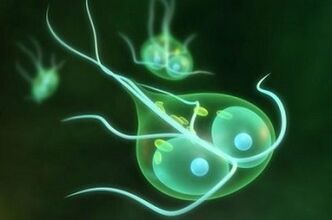
These two parasites live in the human digestive organs and any animal can become their host. They enter the body with dirty water, unwashed fruits or vegetables. Their favorite places are the hepatic ducts, the small intestine and the upper part of the large intestine.
It will not take long for the symptoms to appear and it is difficult not to notice them. The first manifestations are stool disorders. Over time, the temperature rises sharply, severe diarrhea and vomiting begin. Most often a person dies of dehydration, since the last two symptoms practically do not stop, the patient quickly loses water.
The fight against these parasites involves drinking plenty of clean boiled water and taking special salt sachets - preparations with a special composition of salts that help retain water in the body. Prevention is also simple - washing the products, monitoring the condition of drinking water, since it is she who is the source of reproduction of these parasites.
Flatworms
Parasites in the human body can be both unicellular and multicellular. They are flatworms. The name comes from their shape, because they are really flat, because they breathe with the entire surface of the body, so they try to reduce the volume as much as possible. There are 3 types of tapeworms: ciliates, fluke and tapeworm. The former are quite harmless, they live in the earth or in the water. But the second two classes are exclusively parasites.
suction cups
They are small worms that have suction cups on their mouths and stomachs. They prefer to live in our body inside the liver canal and gallbladder. These helminths have two main life stages - a larva and an adult. The host of the larvae can be aquatic molluscs (liver fluke), fish (cat fluke), but cattle and humans are permanent.
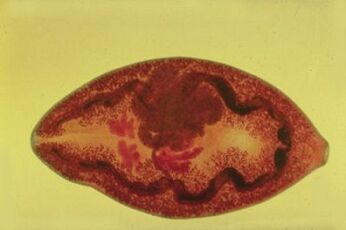
Adults most often settle in the liver area, but sometimes they can enter the intestines, lungs and even the brain. Their accommodation is accompanied by:
- headache;
- losing weight;
- lack of appetite;
- anemia.
They can only be killed by special anthelmintic drugs, which the doctor will prescribe, depending on the type of parasite.
Prevention is simple: don't drink water and try not to swim in standing water bodies, and also don't chew on blades of grass in the field, as many people like to do, becauseFlatworm larvae can also be on the grass.
Save
Tapeworms are so called because these parasites are very long (with the exception of echinococcus), so they really look like a ribbon. They also evolve with a change of "place of residence", but more often it is the person who is the permanent owner.
Tapeworms from cattle and pork attack the small intestine. They are fixed with suction cups and hooks, so that they cannot be pulled out from there by the feces. They are constantly growing, can reach a length of 10 meters or more. They can only be driven away from there with special drugs that will kill the parasite, the suckers will relax, they will fall and come out with feces.
One of the most dangerous representatives of tapeworms is echinococcus. The host of its larva is humans and herbivores, and the adult worm settles in predators. It is the larval stage of the parasite that is dangerous, because its structure differs from that which forms the tapeworm.
The larva of echinococcus is a sac in which many larvae develop. Such a structure can attack the brain, lungs, intestines, liver. She is dangerous with her unlimited growth, because sooner or later she simply tears the tissues of the owner. If the echinococcus has struck the brain or lungs, only an operation can save the patient, but it can also be dangerous.
If tapeworms have settled in our body, then we urgently need to go to the hospital, because they are constantly growing, obstructing the intestines (tapeworms), affecting the lungs or brain (echinococcus), drinking all the vital juicesand kill their host. . Prevention involves checking meat and fish for small white or yellowish larvae. If such products are present, such a product should never be consumed!
Round worms
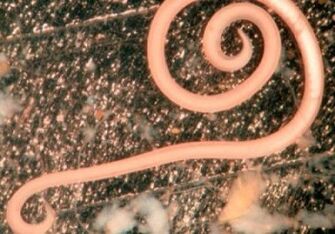
Many have also heard of roundworms, because they poison people's lives no less often than tapeworms, especially small children who suffer from them. The most "famous" representatives are roundworms and pinworms, which inhabit the human intestine. Sometimes they can enter other organs: liver, eyes, brain.
Roundworms develop with a change of habitat: larvae live in a person's lungs, and adults in the intestines. The name "round" characterizes their cross-sectional shape - they are really round.
These worms don't have attachments, but they do have muscles that help them resist feces. Sometimes they themselves crawl out of the body (pinworms) and lay eggs on the anus.
It is children who suffer from it, because babies do not know the rules of hygiene. Therefore, after combing the place of egg deposition, they can put their fingers in their mouths and become infected again.
Treatment is possible with drugs prescribed by a doctor. If the mother of a baby with pinworms is afraid to give her pills, you can cure her without them. To do this, it is necessary at 5-6 o'clock in the morning (this is when the female leaves the body and lays eggs around the anus) to wipe the insides of the priests with vodka, then lubricate the treatment site with baby cream so as not to dry out the delicate skin.
Prevention consists in the fact that you must constantly monitor hygiene: wash your hands after touching the floor, do not drink dirty water.
Parasite test
If you have any doubts about your own health, you can test the body for the presence of parasites. If any of the following symptoms are present, put a plus sign.
- Weight loss is observed without diet and diet change.
- The temperature is constantly increased in the range of 37 to 37. 5 grams.
- There is no appetite or, on the contrary, you have a constant urge to eat.
- There is often an urge to eat something sweet.
- Increased headaches.
- Hot flushes of weakness.
- Stool disorders.
- Nausea or vomiting
- Allergic rashes or swelling.
- Pain in liver and intestines.
- Fainting (if the brain is affected).
- Shaking hands.
- Constant pallor.
If there are 1-4 benefits, it means that there are no worms, but the person is under constant stress, is sick, or has problems with the digestive tract. If there are 5-7 benefits, then there is a suspicion of the presence of parasites, but more than 8 positive responses indicate real problems, therefore urgent need to consult a doctor.
Parasites poison the human body, weaken the immune system, prevent them from leading a normal active life, so you need to remember the symptoms of their manifestation and methods of treatment, as well as preventive measures, because this is onlyso that you can protect yourself and your family.
























